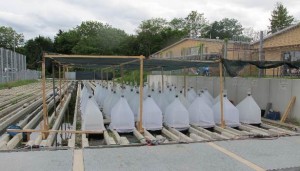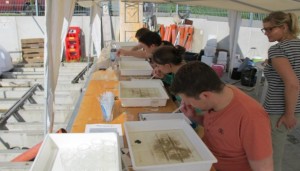In this post, Anna Kästel and Stefanie Allgeier talk about our recently finished outdoor mesocosm study dealing with the potential effects of Bacillus thurinigiensis israelensis (Bti) application on an exemplary wetland ecosystem.
Bti is a soil-dwelling bacterium that is frequently used for mosquito control in temporary wetlands all around the world. Since the beginning of this year, we work on a project funded by the Forschungsinitiative Rheinland-Pfalz and the Deutsche Bundesstiftung für Umwelt (DBU), in which direct and indirect effects of Bti-treatments on non-target organisms are evaluated (for more information on the project, click here). As a major part of the first year we conducted an outdoor mesocosm study where we want to identify the impact of Bti-treatment especially on non-target midges and the food availability for newt larvae as predators. Therefore, we used a randomised block design with 56 experimental units (90L buckets) that were treated once with a field relevant dose of Bti.
The duration of the experiment was linked to the development of the inserted newt larvae and lasted from the beginning of May to the mid of July. The samplings included organisms in the water phase and emerging insects with special emergence traps. Since the organisms in the water phase samples had to be assessed manually we needed a lot of support of student research assistants to conduct one sampling within one day. At a normal sampling day up to seven student assistants and two responsible PhD students were working on sampling, counting and sorting of the organisms.
One day after application even a television team from WDR visited us to shoot parts of the scientific programme “Quarks und Co” on the topic of mosquitoes. (click here; just available in German).


